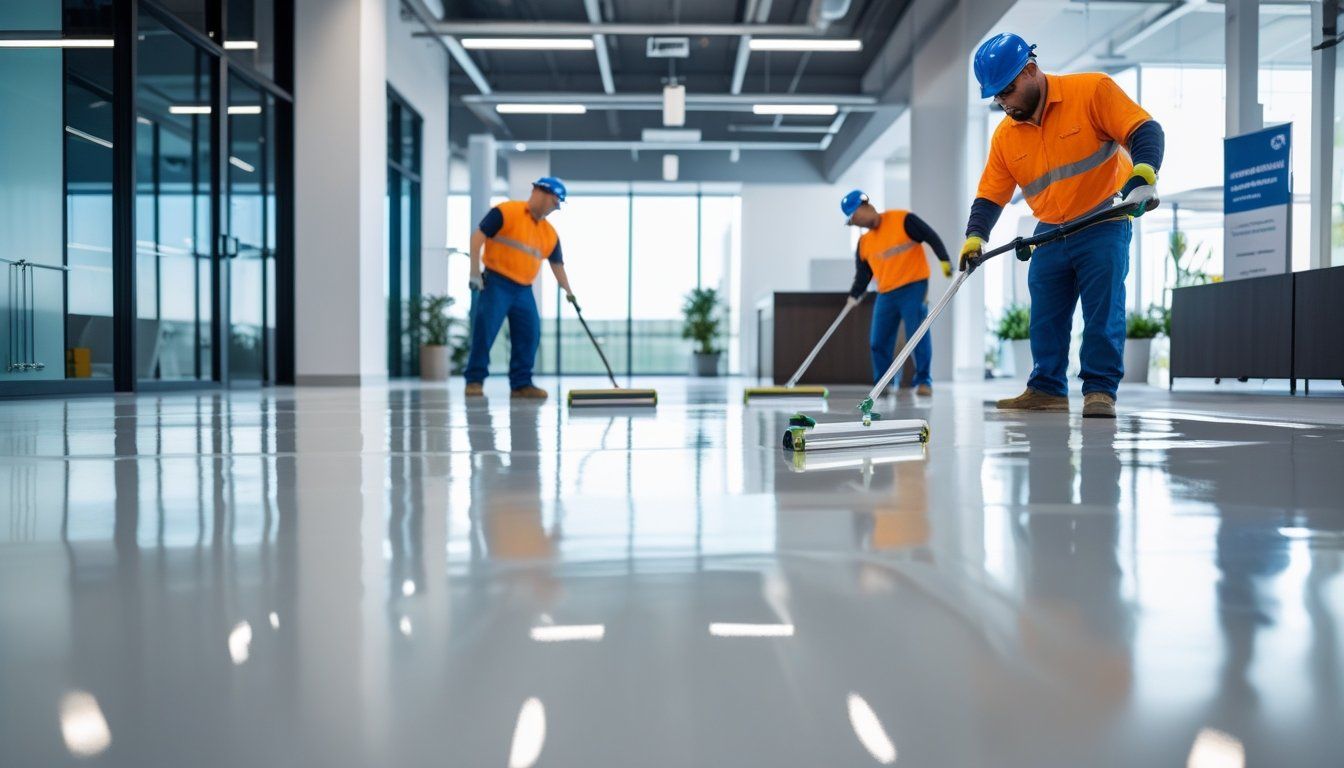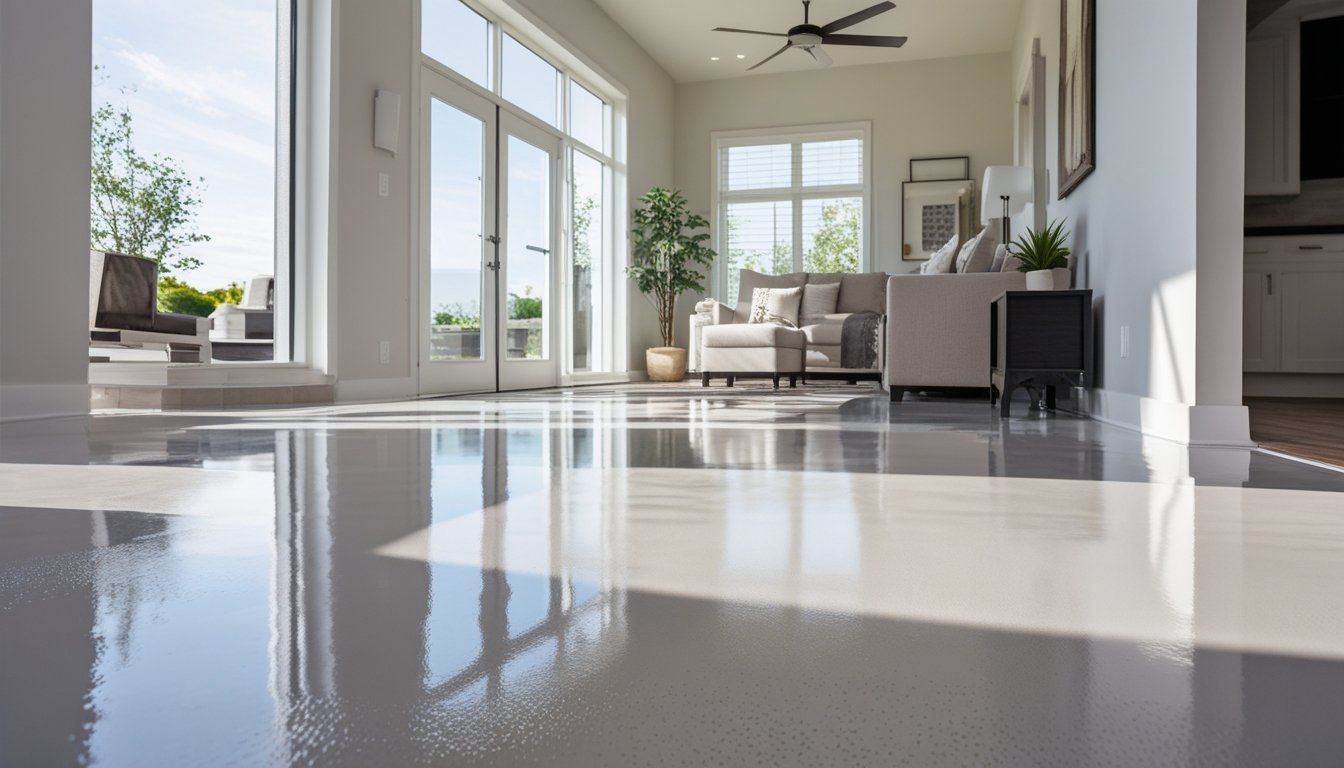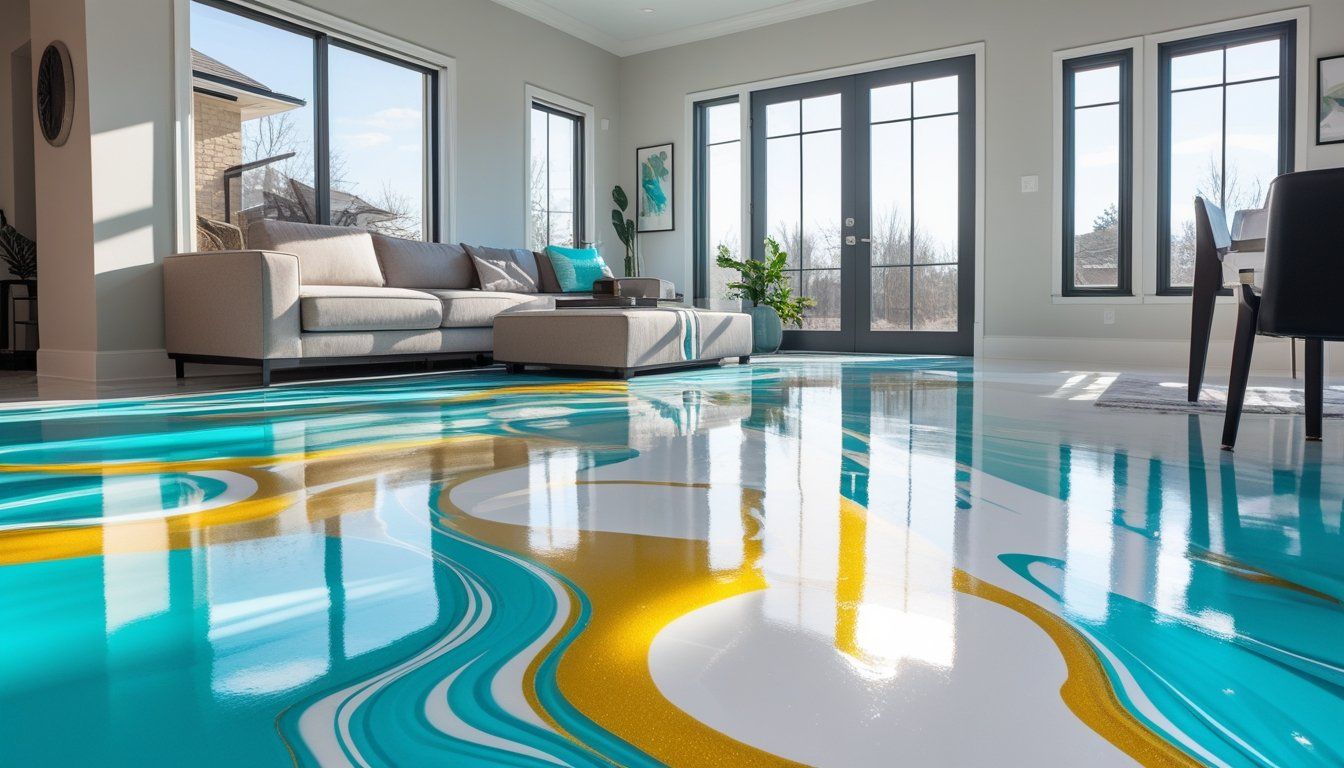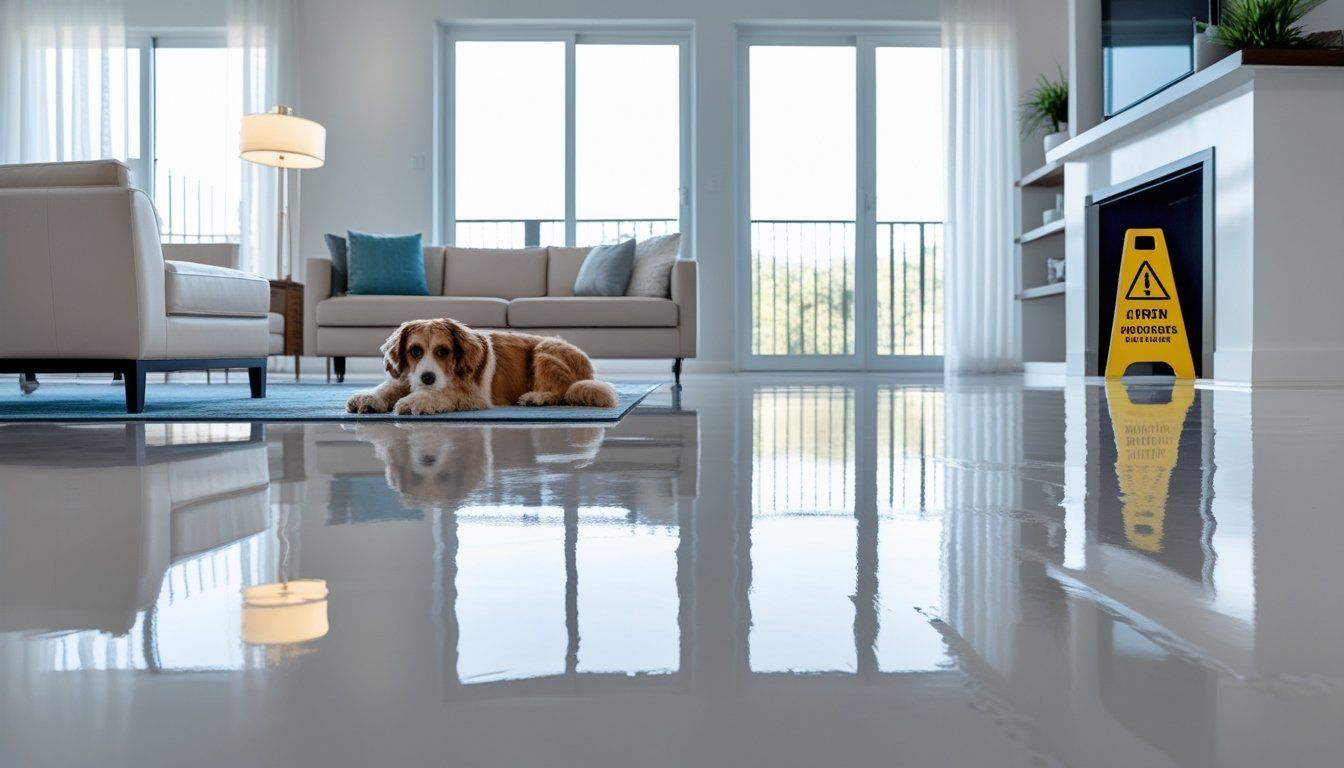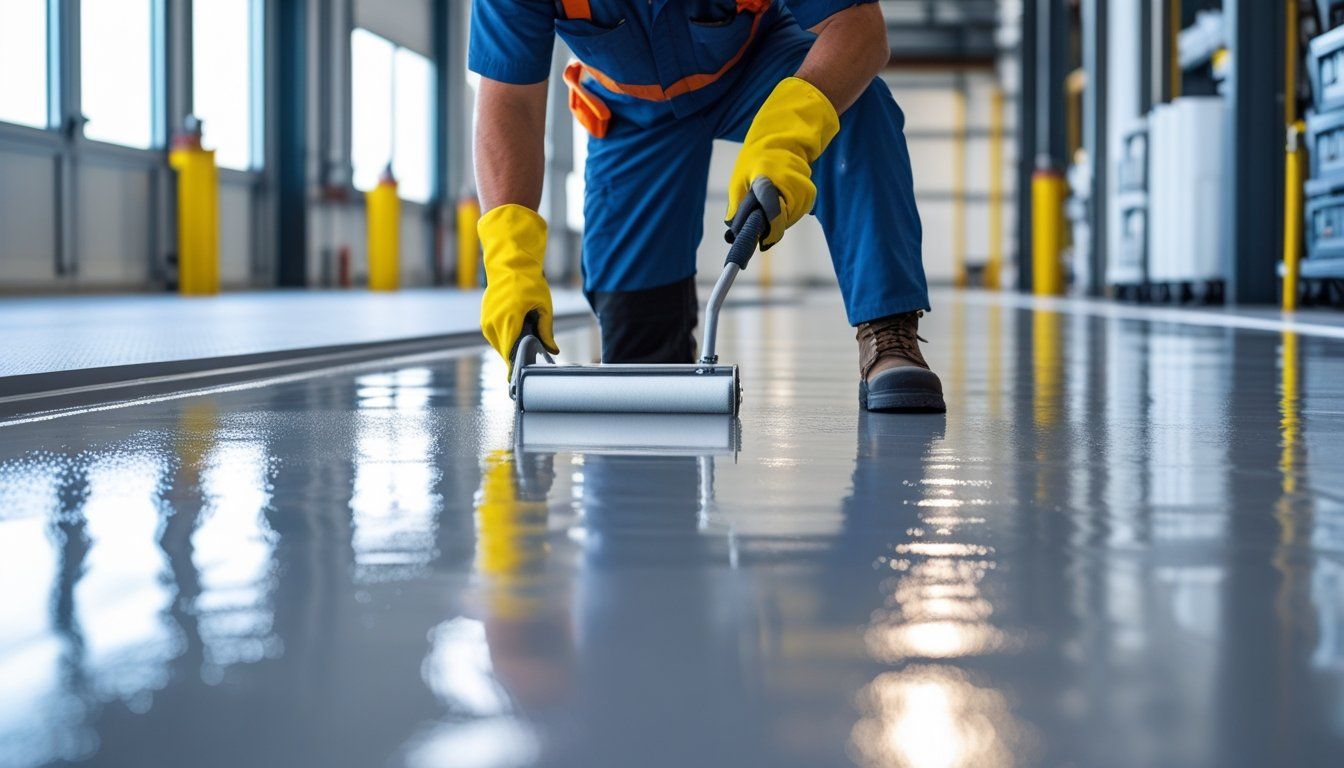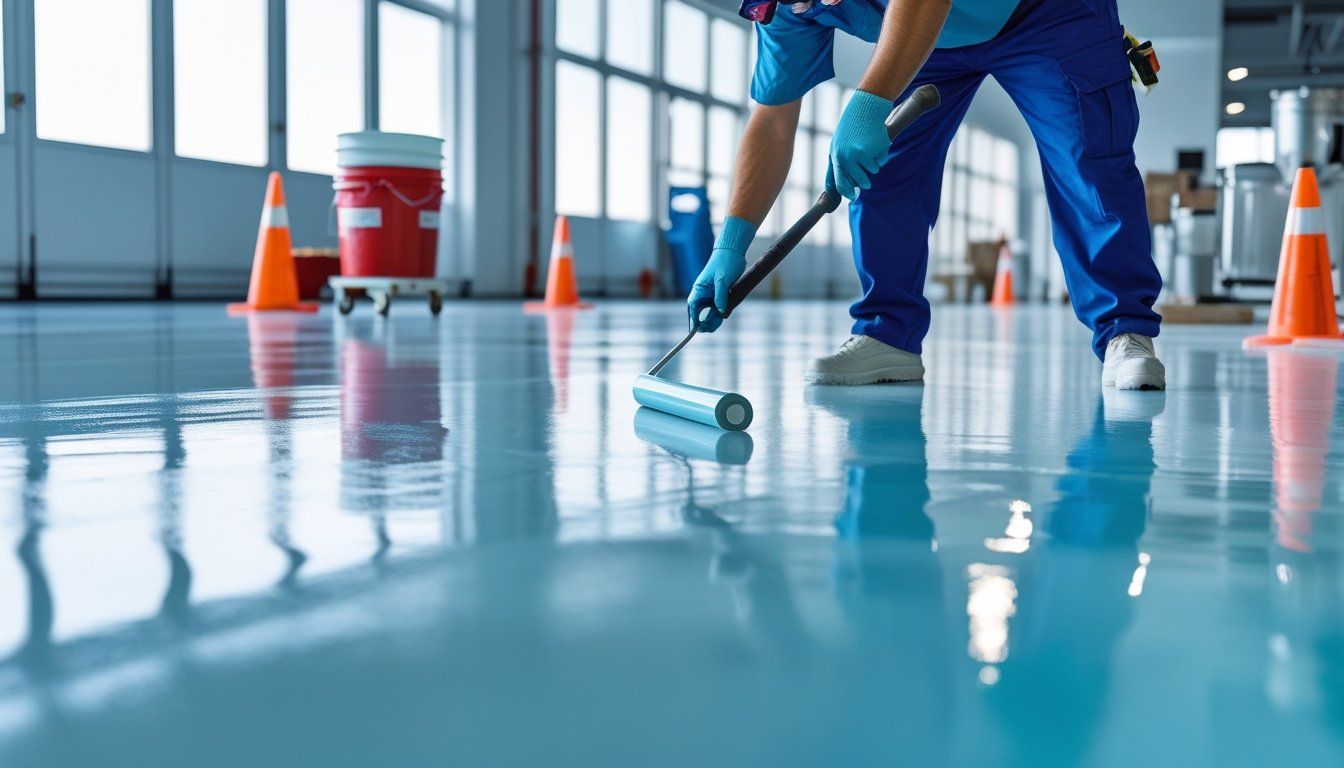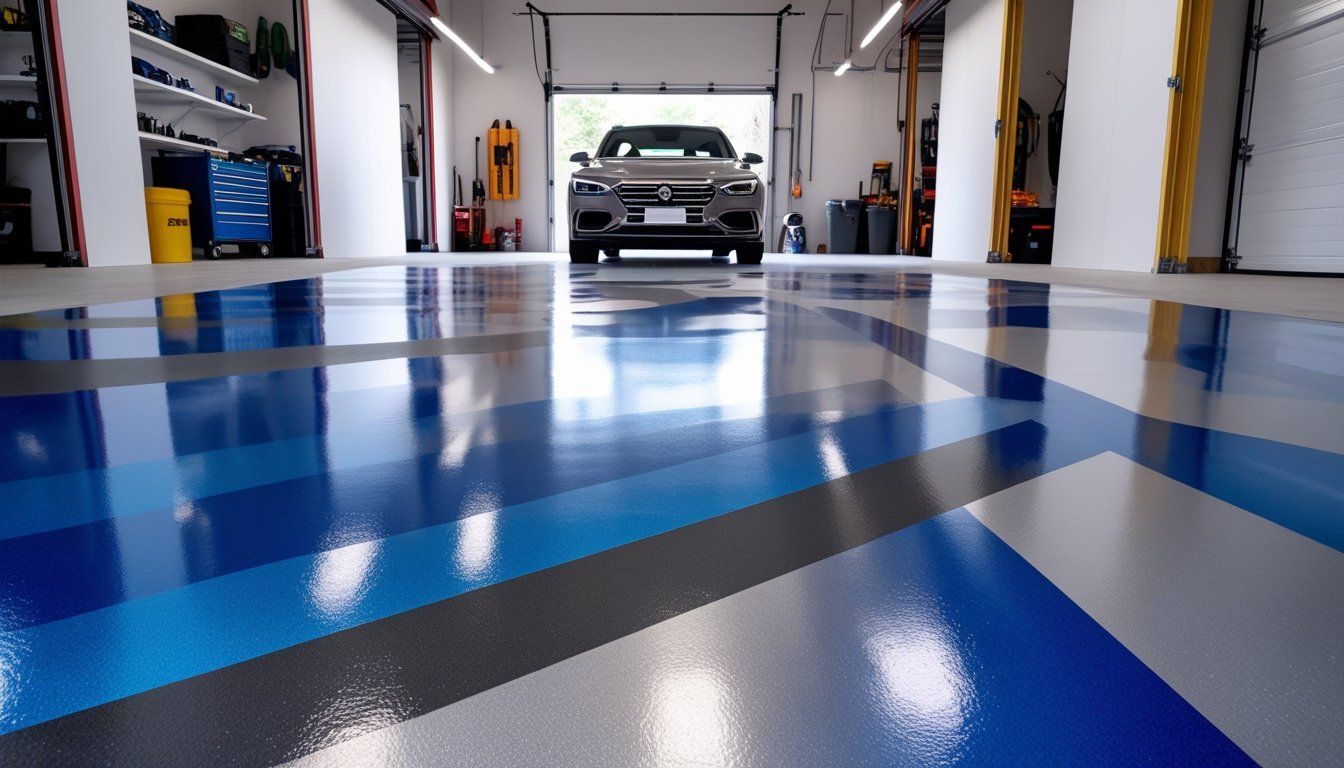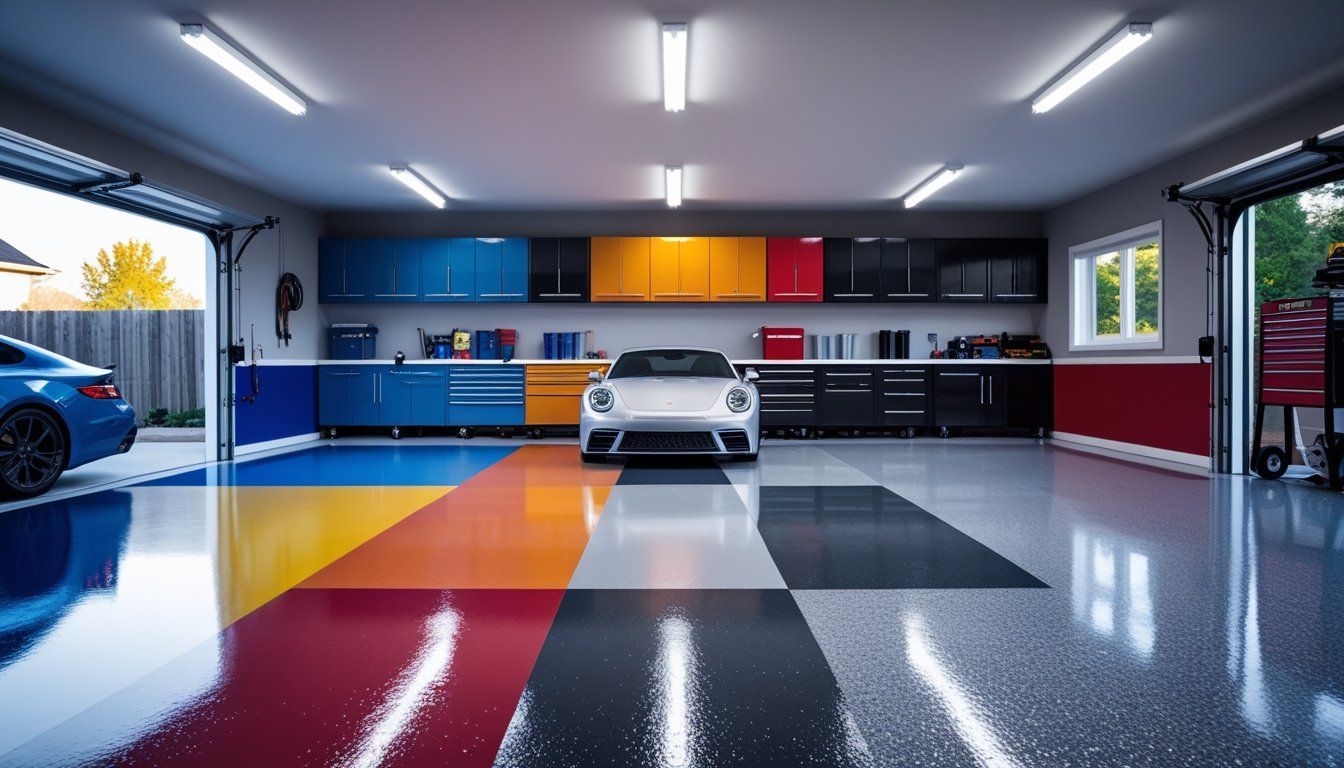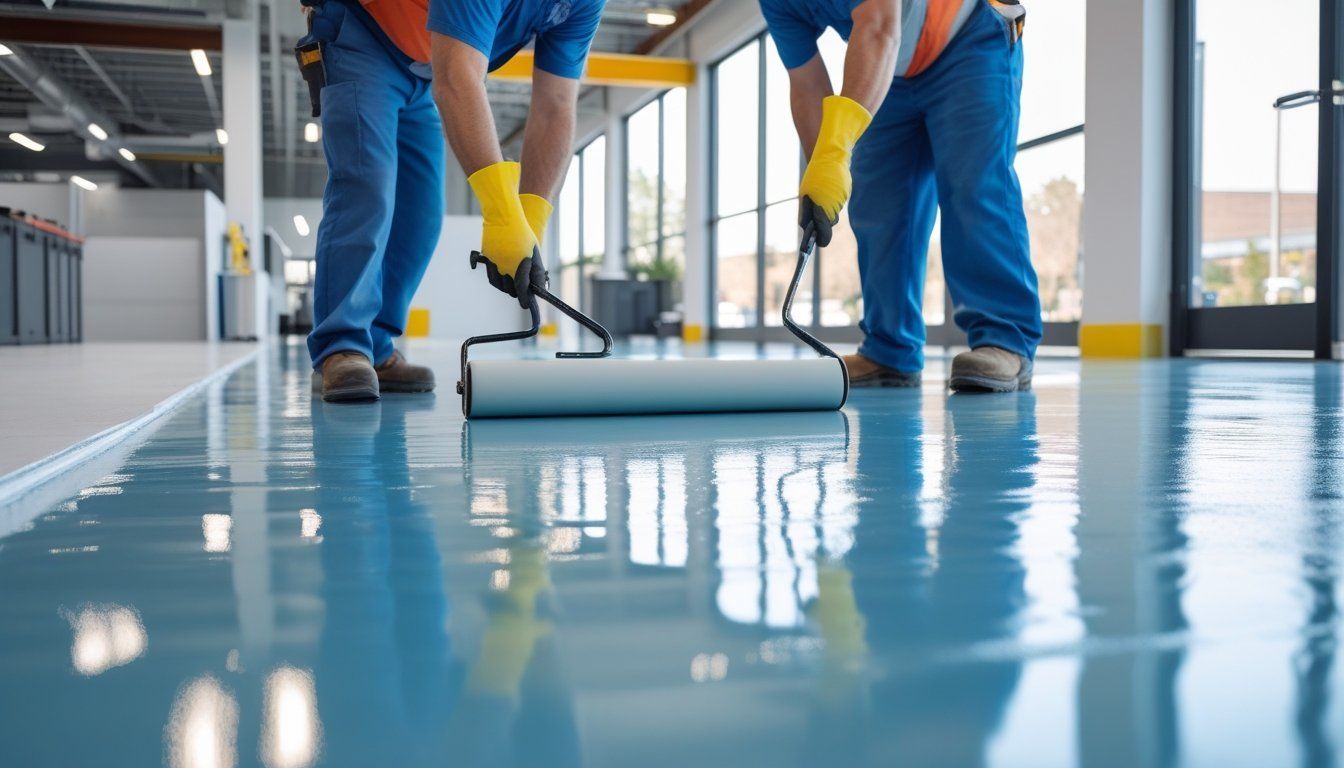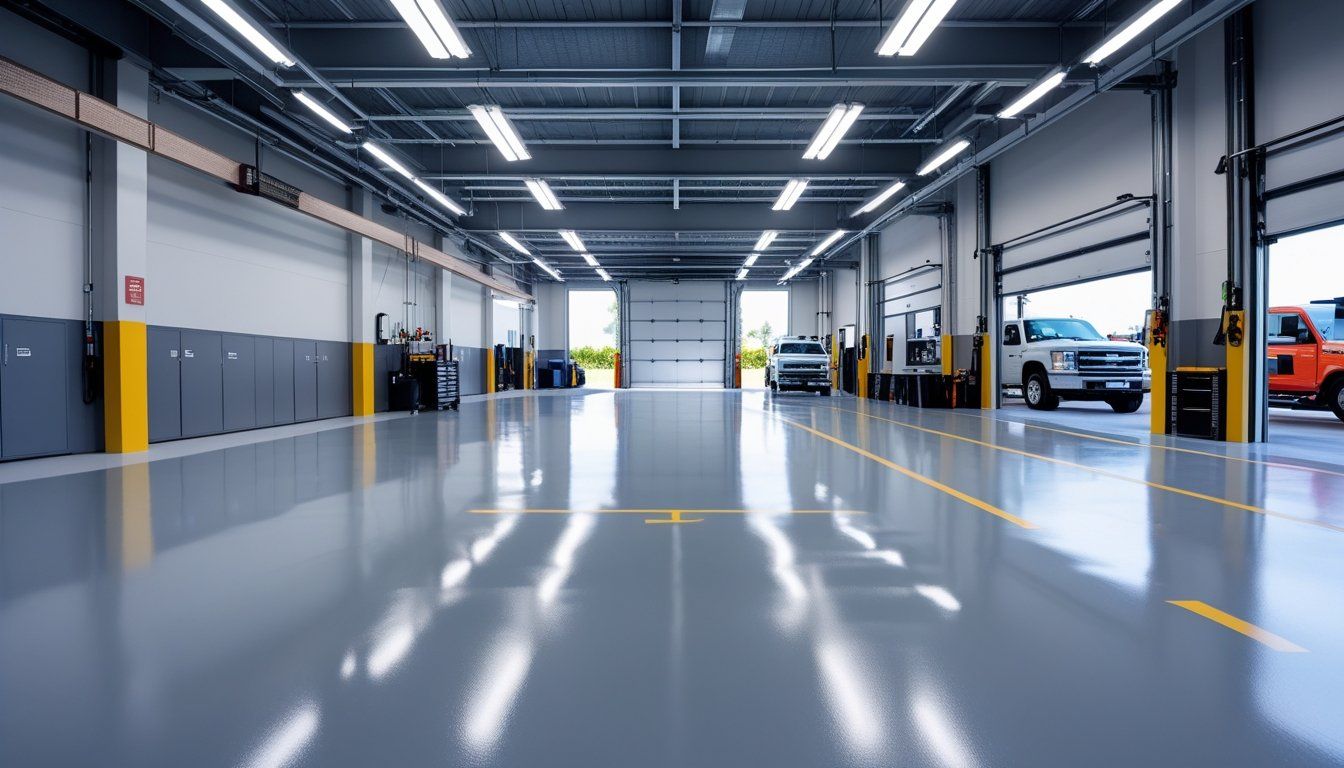Epoxy Resin Flooring Cost Explained: What You Need to Know
Daniel McGonagle • October 10, 2025
Understanding how much epoxy resin flooring costs helps you plan your project and choose the right materials. Pricing depends on factors like floor size, preparation, and design complexity. However, epoxy remains one of the most durable and cost-effective options.
Cambridge MA Epoxy Flooring provides clear, local guidance
for homeowners and companies who want reliable floors without overspending.
Our team helps you balance quality and budget to get long-lasting epoxy floors that look great and perform even better.
In this guide, we’ll break down the main cost factors, from materials and labor to design upgrades and maintenance. You’ll learn what affects epoxy resin flooring prices and how to get the best value for your investment.
Understanding Epoxy Resin Flooring Costs
Epoxy flooring costs depend on several key factors like size, materials, and labor. Knowing how much you might pay helps you plan your budget. Comparing epoxy with other floor types also shows its value for your home or business.
Typical Price Range
Epoxy flooring usually costs between $3 and $12 per square foot. For a small garage of about 200 square feet, prices range from $700 to $2,900.
Larger areas like a three-car garage, around 700 square feet, could cost between $2,200 and $9,500. The wide range comes from different epoxy types, floor conditions, and installation complexity.
A basic epoxy coat is cheaper, while adding designs, colors, or textures increases the price. Local companies offer options that fit various budgets while giving you durable and attractive floors.
Key Cost Factors
Several things affect your epoxy flooring cost:
- Floor Preparation: Cracks or stains need fixing before the epoxy goes on.
- Material Quality: Higher-grade epoxy lasts longer and looks better.
- Design Choices: Adding flakes, metallic finishes, or anti-slip textures costs more.
- Labor: Experienced installers charge more but ensure a smooth finish.
- Project Size: Bigger areas lower the price per square foot, but the total cost is higher.
- Location: Local labor rates in Cambridge and Greater Boston can affect pricing.
Cost Per Square Foot
Most epoxy flooring quotes break down to a price per square foot. Basic epoxy installation usually costs between $4 and $10 per square foot. This includes materials and labor but may not cover detailed prep work or specialty designs.
Getting a clear per-square-foot price helps you compare installers and plan your budget.
Comparison With Other Flooring Types
Epoxy flooring often costs less than hardwood, tile, or polished concrete but offers strong durability and low maintenance. Unlike wood, epoxy resists stains and scratches easily. Compared to tile, epoxy provides a seamless surface with no grout lines to clean.
Polished concrete can be similar in cost but may require more maintenance. If you want a long-lasting floor that handles spills, foot traffic, and heavy equipment, epoxy is a smart choice.
Design Appeal and Value in Modern Interiors
Architectural Digest reports that epoxy resin floors
are gaining popularity in residential and commercial design due to their sleek finish and customizable appearance. Designers highlight that epoxy’s reflective surface enhances lighting, making interiors feel larger and more modern.
For property owners, the ability to mimic marble or metallic effects adds both beauty and resale value without high maintenance.
Types of Epoxy Resin Flooring and Their Pricing
Epoxy resin flooring comes in different styles, each with its own look and cost. The price depends on the design complexity, materials used, and installation. Understanding these types helps you choose the right option for your space and budget.
Solid Epoxy Coating Costs
Solid epoxy coatings are the most common type. They create a strong, smooth surface that protects concrete from stains, cracks, and wear. This type is often used in garages, basements, and warehouses.
The cost for solid epoxy flooring usually runs between $3 and $7 per square foot for professional installation in Cambridge and nearby areas.
A simple, solid epoxy floor gives you durability without extra design features, making it a budget-friendly choice. This flooring is easy to clean and resistant to chemicals and spills, which makes it ideal if you want a practical and long-lasting floor.
Metallic Epoxy Floor Pricing
Metallic epoxy floors have a shiny, swirling look, giving your area a unique, modern style. This type uses special pigments that create a 3D effect, making it popular for homes, retail spaces, and offices.
Metallic epoxy floors cost more than solid coatings, typically ranging from $7 to $12 per square foot. The price is higher due to the skill and time needed to apply the pigments evenly.
These floors are durable and low-maintenance, but also add a polished appearance. If you want your floor to stand out with a bold design, this option fits well.
Quartz Epoxy Flooring Cost
Quartz epoxy flooring mixes colored quartz granules into the epoxy resin. This adds extra texture to the surface, creating slip resistance and a decorative look. This type of floor is common in commercial and industrial settings where safety is key.
The cost is usually between $6 and $10 per square foot, depending on the quartz amount and color choices. Quartz epoxy floors stand up well to heavy foot traffic and are easy to clean, making them great for busy spaces like gyms or workshops.
Labor and Installation Considerations
When installing epoxy resin flooring, labor and time play big roles in the total cost. How you choose to install it can affect your budget and the final look. Understanding professional rates, DIY expenses, and how long it takes will help you make the best choice for your space.
Professional Installation Charges
Hiring experts usually costs between $3 and $12 per square foot. The price depends on floor size, condition, and the details you want, like colors or textures. Labor is often the biggest part of the cost, especially if your floor needs repairs or prep work.
Professional installers bring skill and experience, which helps avoid mistakes. They use the right tools and materials to ensure a smooth, durable finish. Local companies offer reliable service with clear pricing, helping you plan without surprises.
DIY Installation Costs
Doing it yourself might save money up front, with kits costing under $100 for small areas. But there are limits. You need time, patience, and the right tools to prep concrete properly. Mistakes like poor surface cleaning or uneven mixing can lead to bubbling, peeling, or weak spots.
DIY can work well for small, simple jobs if you follow instructions carefully. For bigger areas or commercial projects, professional installation is usually safer and more cost-effective in the long run. If you choose this route, budget for cleaning supplies and potential repair costs if the finish fails.
Installation Timeframes
Installation time depends on your floor’s size and condition. For a typical garage or basement, professionals usually need 2 to 4 days. Prep work often takes the most time, including cleaning, sanding, and fixing cracks. After applying epoxy, curing time matters.
Usually, floors need 24 to 72 hours to dry completely before use. You should plan for some downtime with limited access to your space.
Material Quality and Thickness Impact on Cost
The quality of epoxy and the thickness of the layers you choose directly affect how much your project will cost. Different epoxy grades offer various durability levels, and thicker floors need more material and labor.
Custom finishes or additives can also raise costs, but give you a more personalized, long-lasting floor.
Epoxy Grade Differences
Not all epoxy is the same. There are water-based, solvent-based, and 100% solids epoxies. Water-based epoxy is usually the cheapest but less durable. Solvent-based is stronger and costs more.
The highest quality is 100% solids epoxy, which is thicker and lasts longer, especially in heavy traffic areas. Metallic or decorative epoxies fall into a premium category. They cost more but add shine and style.
Floor Thickness and Layering
The thickness of your epoxy floor changes the cost since thicker floors need more epoxy material and extra labor time. A basic garage floor
can be coated with a 1–2 millimeter layer, but industrial spaces may require 3–6 millimeters or more to handle heavy machinery and wear.
Layers build up depending on whether you want extra protection or decorative effects. For example, you might have a base coat, flake layer, and a clear topcoat, each adding to the total price. Thicker floors last longer but will cost more upfront.
Additives and Custom Finishes
Adding flakes, metallic finishes, or anti-slip textures changes the price of your epoxy flooring. Flakes help hide imperfections and add color, but increase material and labor costs.
Metallic finishes create a shiny, 3D look but require special mixing and application skills. Anti-slip additives improve safety, especially in wet areas, and can be essential for homes with kids or busy businesses.
These extras make your floor more unique and functional, but come with a higher material cost and installation time.
Project Size and Location Influences
The size of your flooring project and where it is located can change the price quite a bit. Larger spaces usually give you a better price per square foot. Your local area’s labor costs and material availability also affect the total cost.
Residential vs Commercial Projects
Residential epoxy flooring often covers smaller spaces like garages, basements, or patios. Because these areas are smaller, the price per square foot may be higher than for bigger projects.
Residential floors also sometimes need extra prep work for cracks or stains, which adds to the cost. Commercial projects usually cover larger spaces like offices, gyms, or showrooms.
Because contractors can work on bigger areas, you often pay less per square foot. However, commercial floors may need specialized coatings for safety or durability, which can increase the price.
Regional Price Variances
The area where you live matters for epoxy flooring costs. Local labor rates, availability of materials, and even how easy it is to get to your property all influence pricing.
For example, costs tend to be higher in cities like Cambridge and Boston compared to smaller towns nearby. If your project location is hard to reach or has tricky access, installers may charge more for the extra time and effort.
On the other hand, areas with many local contractors may offer more competitive pricing.
Additional Expenses to Consider
When planning for epoxy resin flooring, there are some extra costs beyond materials and labor. These costs often come from the condition of your existing floor and the work needed to make it ready for epoxy. Knowing these expenses helps you budget better.
Subfloor Preparation Costs
Your concrete subfloor must be clean, smooth, and free of damage for the epoxy to stick well. Preparation can include grinding, shot blasting, or scarifying to remove old coatings or uneven spots.
If your floor has dust, grease, or moisture, the installer must address these issues first. Moisture tests may be required.
Fixing moisture problems or deep cleaning adds to the cost. Good preparation improves epoxy’s durability and look. These prep steps usually add $1 to $3 per square foot to your total price, depending on your floor's condition.
Repair and Removal Fees
Cracks, holes, or damaged concrete must be fixed before epoxy can be applied. Repair work might include filling, patching, or leveling. Sometimes, old flooring, like paint or tiles, must be removed first. If your floor needs this extra work, expect higher fees.
Removing old coatings can cost $1 to $4 per square foot. Repairs vary but usually range from $2 to $5 per square foot.
Long-Term Value and Maintenance Costs
Epoxy resin flooring offers durable surfaces that hold up well over time, with low upkeep compared to other floor types. Knowing how long your floor will last, what maintenance it needs, and repair costs helps you plan your investment
wisely.
Expected Longevity
Epoxy floors last 10 to 20 years or more when installed and maintained properly. This lifespan depends on factors like foot and vehicle traffic, floor prep, and quality of materials. Areas with heavy use, like warehouses or busy garages, might see wear sooner.
A floor installed by experts can keep its look and function much longer. Regular maintenance and avoiding harsh chemicals can also extend the life of your epoxy floor. You get strong floors that resist stains, cracks, and peeling for a decade or longer.
Maintenance Requirements
Epoxy floors are simple to care for. You only need basic cleaning, like sweeping or mopping with mild soap and water, to keep your floor shiny and safe. Avoid abrasive cleaners, harsh chemicals, or strong acids, as they can damage the coating.
Re-coating every 3 to 5 years may be required if your floor sees heavy traffic or wear. This refreshes the finish and protects the surface from damage.
Because epoxy floors are non-porous and stain-resistant, they do not trap dirt or moisture. This makes them more hygienic and easier to maintain than concrete or tile.
Cost of Repairs
Repairing epoxy floors tends to be affordable but depends on the type. Small cracks or chips usually need patching, which costs about $2 to $5 per square foot. More severe damage, like deep cracks or large flakes, might require sanding and re-coating from professional installers.
This could cost between $4 and $8 per square foot. Regular inspections help catch problems early, avoiding costly repairs. Properly applied epoxy floors often need fewer repairs.
Tips for Saving on Epoxy Resin Flooring
Choosing epoxy resin flooring is a smart move for durability and style. To keep costs down without cutting quality, start by preparing your space well. Fix cracks and clean the concrete yourself before installation. This helps reduce labor time and fees.
Another way to save is by opting for simpler designs. While decorative flakes or metallic finishes look great, they add to the price. You can always add those upgrades later if you want. If you’re handy, consider a DIY epoxy flooring kit for smaller projects like your garage or basement.
It can cut installation costs. For bigger or commercial spaces, professional installation ensures the best results and longer-lasting floors. Working with local experts
can also save you money. Local installers understand the demands of homes and businesses in Cambridge and nearby towns.
They offer fair pricing and tailored advice to fit your budget. Ask for a clear estimate that outlines all costs, so you avoid surprises. Some contractors might include prep, materials, and labor separately. Knowing this helps you spot better deals.
Contact a trusted company for a free consultation and find out how we can make your floors last.
Get Lasting Value With Epoxy Resin Flooring
Epoxy resin flooring delivers a strong mix of affordability, style, and durability for residential and commercial spaces alike. It resists wear, chemicals, and stains while offering clean, modern design options that enhance any environment.
Cambridge MA Epoxy Flooring helps homes and businesses throughout Greater Boston plan and install epoxy floors that fit their budgets.
Our team focuses on quality materials, skilled installation, and transparent pricing to ensure lasting results.
Ready to upgrade your floors with a durable, low-maintenance epoxy finish?
Contact us today
to request your free quote and learn how epoxy resin flooring can improve your space for years to come.
Frequently Asked Questions
Epoxy flooring costs vary based on the type of epoxy, area size, and design choices. You will want to understand pricing per square foot, how to estimate total costs, and what budget fits your specific space, like a garage or mid-sized room.
How Much Should I Expect to Pay Per Square Foot for Epoxy Resin Flooring?
You can expect to pay between $2 and $12 per square foot. Basic water-based epoxy is cheaper, while solid resin or metallic finishes cost more. Preparation and repairs may add to the price.
Is There a Way to Calculate the Cost of Epoxy Flooring Before Installation?
Yes, you can estimate costs by measuring your floor’s square footage and choosing the epoxy type. Adding in labor and any surface repairs will give you a clearer total. Cambridge MA Epoxy Flooring can provide a detailed quote to avoid surprises.
What's the Average Cost of Epoxy Resin Flooring in My Area?
In Cambridge and Greater Boston, average prices often range around $5 to $8 per square foot for standard epoxy flooring. Costs depend on your exact location and project complexity. Local installers like Cambridge MA Epoxy Flooring know area rates well.
Can You Give Me an Idea of the Cost for a Two-Car Garage Epoxy Flooring?
A typical two-car garage is about 400 to 500 square feet. Expect to pay between $1,000 and $6,000 based on epoxy type and floor condition. Metallic or decorative finishes add cost, while simpler epoxy is more affordable.
What Are the Price Differences Between Standard and Metallic Epoxy Floor Options?
Standard epoxy is usually $2 to $5 per square foot. Metallic epoxy costs more, often $6 to $12 per square foot, because of the special pigments and more complex application. Metallic floors offer a unique shine and design effect.
How Much Epoxy Do I Need for a Mid-Sized Room and What Will That Cost?
A mid-sized room is generally around 200 to 300 square feet. You’ll need epoxy coverage matching that area. Materials and installation often total between $800 and $3,600, depending on epoxy quality and surface prep. Getting a quote from local professionals helps clarify the exact costs.
